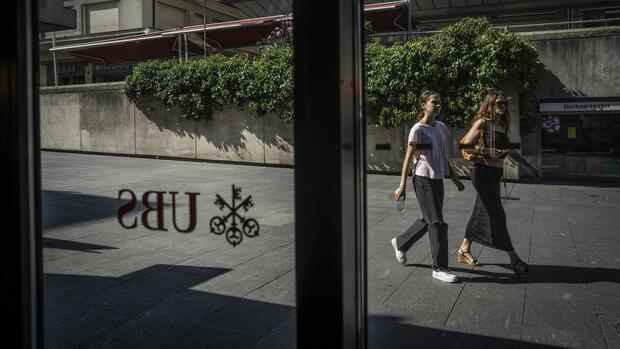The bank clearly sets itself apart from rival Credit Suisse.
(Photo: Bloomberg)
Zurich The mix of geopolitical risks and concerns about inflation is also affecting UBS’s business. The major Swiss bank can also report a net profit of 2.1 billion dollars in the second quarter, five percent more than in the same quarter last year. This is the highest profit in a second quarter in ten years, as announced by UBS on Tuesday. But a large part of the profit is due to proceeds from the sale of a stake in Japan.
UBS also failed to meet analysts’ expectations. In a survey conducted by the bank, they had assumed a net profit of $2.4 billion. “The second quarter was one of the most difficult phases for investors in the past ten years,” said CEO Ralph Hamers.
In the most important business areas, UBS has to cope with a double-digit decline in pre-tax profit: In wealth management, the pre-tax profit went downwins back by eleven percent compared to the same period last year to almost 1.2 billion dollars. Higher interest income was swallowed up by lower fee income and weaker trading business, UBS said.
Business in the investment division collapsed even more – there sank pre-tax profit increased 39 percent to $410 million. In particular, the business with IPOs (capital markets) has come to a virtual standstill and has yielded 70 percent less than in the second quarter of the previous year. The advisory business for mergers and acquisitions is also weakening, only the derivatives and trading business can grow slightly.
Top jobs of the day
Find the best jobs now and
be notified by email.
In business with professional clients (asset management), UBS was able to record a leap in profits through the sale of its stake in a joint venture. But without the deal, the decline in pre-tax profit would have been a whopping 56 percent.
In addition, the stable Swiss business is also slowing down. There, UBS had already recorded smaller loan defaults in the tens of millions after being able to reduce the provisions for bad loans in the same quarter of the previous year.
And in the head office, the so-called Group Functions, a surprisingly high loss of over 300 million dollars was incurred. UBS boss Hamers wants to reduce this amount to zero in the medium term.
UBS is still heavily capitalized, with a Common Equity Tier 1 ratio of 14.2 percent. UBS boss Ralph Hamers also still has the costs under control: They fell slightly to 70.6 percent. But the environment is not getting any easier for banks, as Andreas Venditti, analyst at Vontobel, emphasizes: “The uncertainty will continue to weigh on customer sentiment.”
Therefore, he expects the rich and super-rich clientele of UBS to hold back with transactions in the following quarter. After all: Venditti certifies UBS that the results in the most important division, wealth management, are in line with expectations. The slump in investment banking and the increase in loan defaults mean that there is little hope for UBS’s competitors either.
More: UBS brings ex-Deutsche banker Ashley Wilson from BNP Paribas
